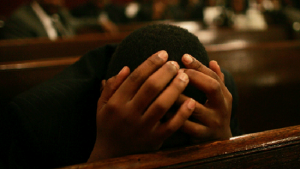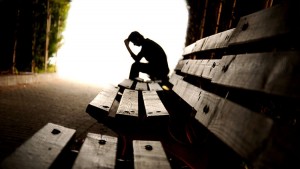“Does God care about me?”
“Why do I suffer so, Jesus?”
“Please help me, God”
“Where are you? Do you even exist?”
People suffering from depression ask these questions in the silence of their hearts. They cry out to God just as others have for millennia when faced with great sorrow:
“My tears have been my food day and night.” Psalm 42:3.
Beyond therapeutic and psychopharmacological bromides, we all seek loving comfort. Sometimes we get it from others – – sometimes we don’t.
We’ve reached our limit to cope, to keep it all together. We’re worn out by the battle.
We’re searching for answers: “Why me?”we ask. Even when we get answers (e.g. it’s “biochemical” or too much negative thinking) from others, the pain may not abate. And so we ask more existential questions about the nature of our suffering.
Barbara Crafton, an Episcopalian Minister and depression sufferer, writes in her book, When Jesus Wept: When Faith and Depression Meet, about this mystery:
“In several ways, above and beyond the genetics, family upbringing and “slings and arrows” of our existence that has brought us to this point in our lives, there is a real mystery to suffering. Why do some people suffer tremendously while others not so much? Why do some people with a certain makeup come down with depression while someone with a similar history do not? It’s a mystery. Often, while people who get treatment and help come to find out some of the reasons that they’re depressed, it often isn’t enough. The answers don’t always heal us.”
Abraham Lincoln, who struggled with depression his entire life, was quoted in the book Lincoln’s Melancholy: How Depression Challenged a President and Fueled his Greatness:
“I have been driven many times upon my knees by the overwhelming conviction that I had nowhere else to go. My own wisdom and that of all about me seemed insufficient for that day.”
Much like Lincoln, we can feel powerless to stop our depression. It is BIG and we are small. Anything other than the crushing experience of depression feels unreal. We’re not in the normal stream of life that everyone else is swimming in: we’re drowning.
I had never encountered any pain greater than depression. Other types of pain I could deal with and recover from: a burst appendix in college and blown out ligaments in my knee years ago. But depression? There wasn’t any surgery I could have, no caste that could be fitted. I felt like I was dying. In the book Unholy Ghosts: Writers on Depression, writer Susanna Kaysen captures this experience:
“The worst thing about depression – the thing that makes people phobic about it – is that it’s a foretaste of death. It’s a trip to the country of nothingness. Reality loses its substance and becomes ghostly, transparent, unbearable. This perception of what’s outside affects the perception of the self, which explains why depressed people feel they aren’t ‘there.’”
So in the face of so much pain, we look for power outside of ourselves. We place our hope in Someone bigger than our depression – – God.
It’s tough to pray when we’re depressed
Praying when in the throes of depression is a challenge. We might not be able to muster the energy, feel like it isn’t making a dent in our depression; or, worse yet, our faith falters and we stop believing.
We grow despondent.
We give up hope.
We give up on God.
We want salve on our wounds, but depression just keeps throwing salt in them. We yearn so badly for God’s direction (“Show me the way out of this darkness”), but it always doesn’t come.
Barbara Crafton writes:
“It makes every bit of sense for a person to whom faith is a matter of importance – even one who doesn’t think that all human sorrow can be magically prayed out the window – to hope that it will somehow illuminate the darkness of depression. We understand that nobody ever promised us a rose garden, but could we perhaps have a little light?”
Depression is a terrible liar
In a sense, depression is a temptation. It calls us. It whispers in our ear that all is lost and that we’ll never find our way back home. It’s a terrible liar, really. It spins the yarn that we’re worthless and there’s no point in living. And these messages repeat themselves over and over again in our minds and souls. And they all seem so true and unchangeable.
John Piper wrote in When Darkness Will Not Lift: Doing What We Can While We Wait for God – And Joy:
“…We should all fortify ourselves against the dark hours of depression by cultivating a deep distrust of the certainties of despair. Despair is relentless in the certainties of its pessimism. But we have seen again and again, from our own experience and others’, that absolute statements of hopelessness that we make in the dark are notoriously unreliable. Our dark certainties are not sureties.”
Who do You say I am?
One of the most powerful scenes in the Bible is when Jesus turns to Peter and says, “Who do you say I am?”
I like to imagine Jesus standing across from me. He’s looking directly into my eyes. I reach out to Him. and say, “Lord, who do You say I am?” It clearly isn’t what my depression judges me to be. Jesus is always affirming, always loving, always telling us just how precious we are. THAT is the voice we need to listen to and embrace.
A Light in the Darkness
Mother Teresa once wrote:
“If I ever become a saint—I will surely be one of ‘darkness,’” After her death, Many suggest that she suffered from clinical depression and long periods where she sought to understand God’s absence in the face of so much inner pain.
Therese Borchard writes:
“I spent a week with Mother Teresa and her Sisters the winter of 1994. I stood beside her for about two hours as we distributed Christmas gifts to orphaned children. I sensed sadness in her. But her light overshadowed it. Unlike a person wrapped in severe depression, wearing the expression of despair, she exuded light and hope. When she prayed, her deep love for God was visible, even contagious.
This saint of darkness has much to teach me about how to live with inner anguish.
First of all, I should stop referring to my depression and anxiety as the “Black Hole,” (singular and capitalized), and call it, as Mother Teresa described her difficult places, the “dark holes.” Because the darkness is never black, or without any light at all. Her legacy is proof that hope and faith and love prevail, even in the dark night.”
A few years ago, I composed this prayer.
Dear God,
I am on my knees, because I don’t have the strength to stand up.
My strength is gone. I can’t deal with my depression by myself any longer.
I am lonely.
I call on You.
I have faith that Your strength is bigger than my depression,
that Your mercy and healing white light will show me the path home.
I am not alone.
You’re rod and staff comfort me as I walk through the valley of the shadow of depression
and there is nothing I shall fear.
Amen
So don’t lose hope. Don’t lose God. He’s working somewhere in the pain to heal you.
As Pope John Paul, II wrote:
“Do not abandon yourselves to despair. We are the Easter people and hallelujah is our song.”
By Daniel T. Lukasik, Copyright 2015







 “The people walking in darkness have seen a great light; on those living in the land of the shadow of death a light has dawned. For to us a child is born, to us a son is given, and the government will be on his shoulders. And he will be called Wonderful Counselor Mighty God, Everlasting Father, and Prince of Peace.”
“The people walking in darkness have seen a great light; on those living in the land of the shadow of death a light has dawned. For to us a child is born, to us a son is given, and the government will be on his shoulders. And he will be called Wonderful Counselor Mighty God, Everlasting Father, and Prince of Peace.”










